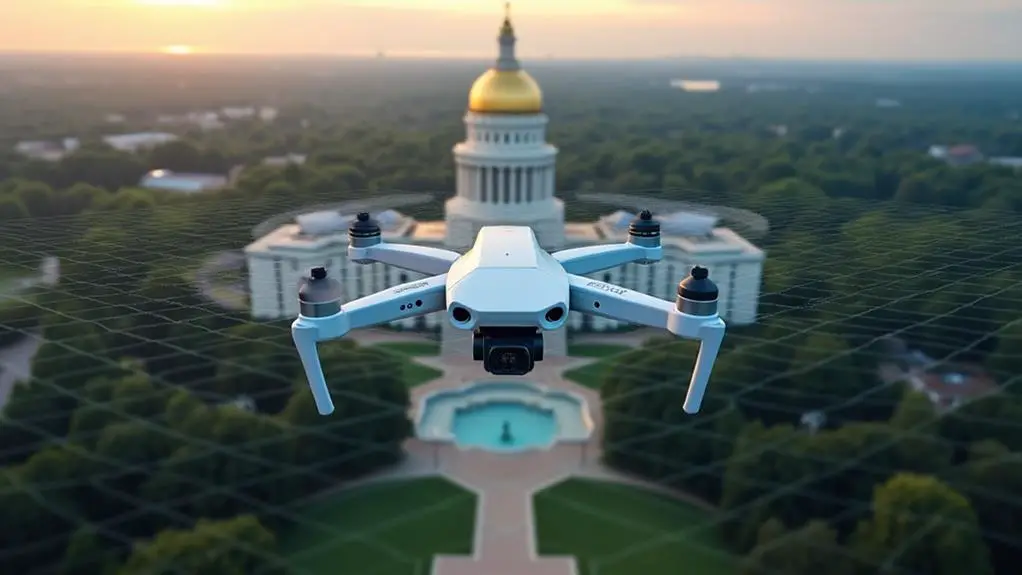
Are you aware that flying a drone in Georgia without following the rules can land you in hot water? It's true that the Peach State has its own set of drone laws, but do you know what they entail? For instance, did you know that recreational users need to register their drones with the FAA if they weigh over 0.55 pounds? And what about commercial operators – do they need to comply with Part 107 regulations? You'll want to get familiar with these laws to avoid fines, criminal charges, or even imprisonment. Let's take a closer look at what you need to know to fly safely and legally in Georgia.
Contents
- 1 Key Takeaways
- 2 Recreational Drone Use in Georgia
- 3 Commercial Drone Operations
- 4 Drone Registration Requirements
- 5 Airspace Restrictions and No-Fly Zones
- 6 Penalties for Non-Compliance
- 7 Frequently Asked Questions
- 7.1 Can I Fly a Drone Over a Friend's Private Property With Their Permission?
- 7.2 Are There Any Age Restrictions for Flying Drones in Georgia?
- 7.3 Can I Fly a Drone With a Camera in National Parks in Georgia?
- 7.4 Do I Need to Carry Drone Insurance in Georgia?
- 7.5 Can I Fly a Drone at Night With Additional Lighting in Georgia?
- 8 Conclusion
Key Takeaways
- In Georgia, recreational drones over 0.55 pounds must be registered with the Federal Aviation Administration (FAA) and labeled with a registration number.
- Commercial drone operators must comply with Part 107 regulations, including maintaining a Visual Line of Sight (VLOS) with the drone and flying below 400 feet.
- Drone operators must respect airspace restrictions, including no-fly zones around airports, national parks, military bases, and stadiums, as well as private property without owner consent.
- Failure to comply with Georgia's drone laws can result in fines, criminal charges, and imprisonment, and can have serious consequences for public safety.
- Drone operators are responsible for familiarizing themselves with Georgia's drone laws and regulations to avoid penalties and ensure safe operation.
Recreational Drone Use in Georgia
Operating a drone for recreational purposes in Georgia is subject to specific regulations. You must comply with these rules to guarantee Drone Safety and avoid legal repercussions.
Firstly, you must register your drone with the Federal Aviation Administration (FAA) if it weighs more than 0.55 pounds.
Additionally, you'll need to label your drone with the registration number.
When flying, you should maintain a visual line of sight with your drone and avoid flying over people or stadiums.
It's also vital to respect airspace restrictions, such as those near airports, national parks, or military bases.
If you're interested in Aerial Photography, be aware that you can't fly over private property without the owner's consent.
Moreover, you should avoid capturing sensitive information or infringing on people's privacy.
Lastly, always check the weather conditions before flying and be prepared for emergencies.
Commercial Drone Operations
As a commercial drone operator, you'll need to comply with Part 107 regulations, which include maintaining a Visual Line of Sight (VLOS) with your drone at all times, flying below 400 feet above ground level, and avoiding operations over people or moving vehicles.
You'll also need to conduct pre-flight checks, including weather assessments and airspace reviews, as part of your Flight Planning process.
Additionally, consider investing in Drone Insurance to protect yourself and your business from potential liabilities.
This insurance can provide financial protection in case of accidents, damage, or data breaches.
Drone Registration Requirements
You've guaranteed compliance with Part 107 regulations and invested in drone insurance to protect your business. Now, it's time to tackle drone registration requirements.
As a drone operator in Georgia, you must register your drone with the Federal Aviation Administration (FAA) if it weighs more than 0.55 pounds and is used for commercial purposes.
You'll need to provide your name, address, and email address, as well as pay a small registration fee. The registration process is typically completed online, and you'll receive a unique registration number that must be displayed on your drone.
Under federal oversight, you're required to renew your registration every three years.
Remember, having drone insurance is vital, as it protects you and your business in case of accidents or damages. Verify you understand the registration requirements to avoid any legal issues or penalties.
Failure to register your drone can result in fines and even criminal charges. Stay compliant, and your business will soar.
Airspace Restrictions and No-Fly Zones
Georgia's skies present a complex landscape of restricted airspaces and no-fly zones, which drone operators must navigate to avoid legal repercussions.
As a drone operator, you must be aware of these restrictions to guarantee safe and compliant flight operations.
When flying in Georgia, you'll encounter various restricted airspaces and no-fly zones, including:
- Airport boundaries: Stay clear of airports and their surrounding airspace, as defined by the Federal Aviation Administration (FAA).
- National security: Avoid flying near sensitive national security locations, such as military bases, prisons, and government facilities.
- Wildlife management areas: Refrain from flying over protected wildlife areas, including national parks, wildlife refuges, and state parks.
- Stadiums and sporting events: Don't fly over stadiums or sporting events, as this poses a risk to people and aircraft.
- Emergency response situations: Avoid flying near emergency response situations, such as wildfires, search and rescue operations, or natural disasters.
Penalties for Non-Compliance
In addition to fines, you may also face criminal charges if you're found to be operating a drone recklessly or with intent to cause harm.
Criminal charges can lead to imprisonment, and you may have a criminal record.
It's vital to understand that drone laws are in place to safeguard public safety, and non-compliance can have serious consequences.
As a drone operator, it's your responsibility to familiarize yourself with Georgia's drone laws and regulations to avoid penalties and guarantee safe operations.
Frequently Asked Questions
Can I Fly a Drone Over a Friend's Private Property With Their Permission?
You can fly a drone over a friend's private property with their permission, but be aware that boundary issues and trespass laws still apply, so guarantee you respect neighboring properties and avoid overflight without explicit consent.
Are There Any Age Restrictions for Flying Drones in Georgia?
Flying a drone is like mastering a precision instrument, and you're wise to ask about age restrictions. In Georgia, you'll need to be at least 16 to fly commercially, with pilot training and age verification required to guarantee safe skies.
Can I Fly a Drone With a Camera in National Parks in Georgia?
When flying a drone with a camera in national parks, you'll need to prioritize wildlife safety and respect Park Rangers' authority; guarantee you're aware of specific park regulations and permits required to operate drones in these protected areas.
Do I Need to Carry Drone Insurance in Georgia?
You're not legally required to carry drone insurance, but considering the risk of accidents and potential drone liability, it's highly recommended to invest in a policy that covers you in case of damages or injuries, especially given the complexities of aviation regulations.
Can I Fly a Drone at Night With Additional Lighting in Georgia?
As you prepare for night flights, you're wondering if additional lighting is the golden ticket. But, do you know the rules? In the dark of night, light regulations take center stage, and you'll need to navigate FAA guidelines to fly safely and legally.
Conclusion
As you navigate Georgia's skies with your drone, remember that compliance is the thread that weaves together a safe and legal flight. Failure to follow the rules can be a tangled web of fines, charges, and imprisonment. Stay informed, register your drone, and respect restricted airspaces to avoid getting caught in the crosshairs of the law. By doing so, you'll be flying high, with the freedom to capture breathtaking views and create unforgettable experiences.





